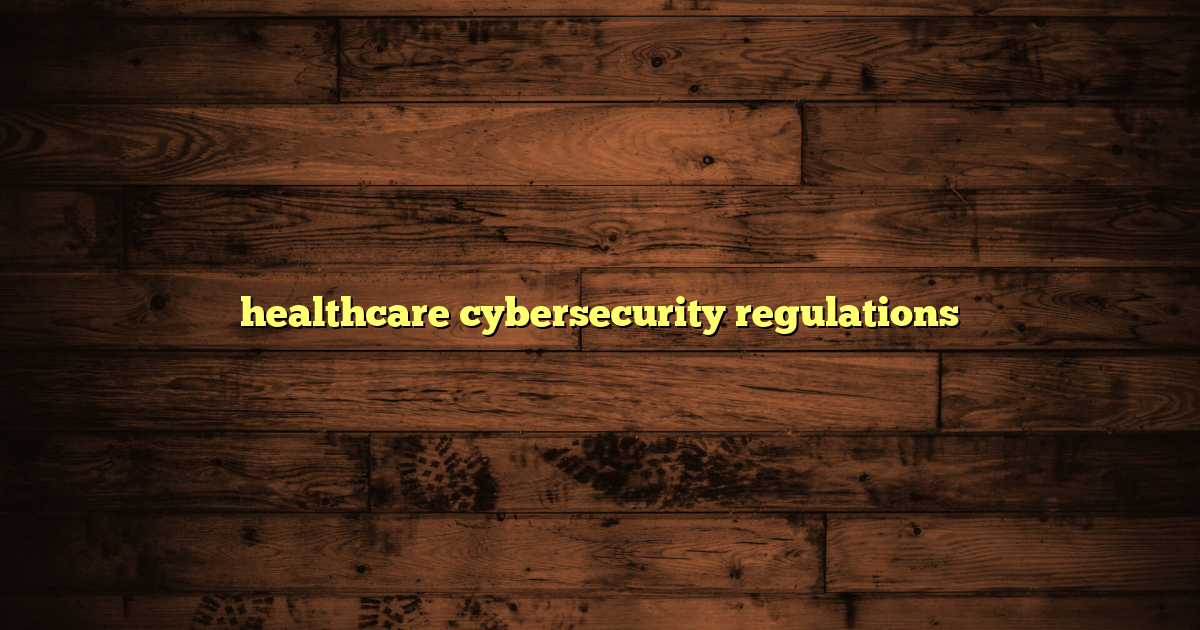healthcare cybersecurity regulations
Table of Contents:
- Introduction to Healthcare Cybersecurity Regulations
- Recent Developments in Healthcare Cybersecurity Regulations
- Proposed Updates to the HIPAA Security Rule
- Legislative Efforts
- Challenges in Implementing Cybersecurity Regulations
- Future Directions and Recommendations
- Conclusion
- FAQ
Protecting Health Data: An Overview of Cybersecurity Regulations
Is your medical data safe? It is an important question, particularly given the increasing number of cyberattacks targeting hospitals and healthcare providers. Data breaches do not only compromise patient privacy – they also disrupt care and cost organizations millions. Regulations are essential to prevent such disastrous events.
Introduction to Healthcare Cybersecurity Regulations
The protection of sensitive patient data and healthcare systems from digital threats is a growing concern. Regulations are essential in that they ensure healthcare organizations are capable of protecting data with true effectiveness. The emphasis on stronger cybersecurity regulations has grown in recent years. This reflects the rising concern about digital safety in the medical sector.
Recent Developments in Healthcare Cybersecurity Regulations
What shifts are occurring in how we regulate cybersecurity in medicine? There have been some major changes and a few developments, as well as it’s important to understand them.
Proposed Updates to the HIPAA Security Rule
One of the most substantial changes is the proposed revisions to the Health Insurance Portability or Accountability Act (HIPAA) Security Rule. The Office for Civil Rights (OCR) issued the proposal January 6, 2025.
- It seeks to improve existing rules for protecting electronic health information (ePHI).
- It would eliminate the distinction between “required” specifications as well as “addressable” specifications.
This adjustment illustrates OCR’s current conviction that all Security Rule specifications are effectively mandatory, increasing compliance expectations for medical entities. The proposed rule increases the required documentation, a move that will help medical organizations maintain detailed records of security practices. This record-keeping is essential to prove compliance during audits as well as investigations. Stakeholders were allowed to give feedback, but the comment period ended March 7, 2025.
Legislative Efforts
Regulatory updates are not the only area of development. Legislation is also being put forward to strengthen medical cybersecurity:
- Health Infrastructure Security plus Accountability Act of 2024 (HISAA) – Senators Ron Wyden and Mark Warner put forward this bipartisan bill, and it seeks to raise cybersecurity standards across the healthcare sector. Details about the bill’s specifics are scarce, but it represents a strong effort to address medical cybersecurity issues.
- Health Care Cybersecurity besides Resiliency Act of 2024 – Senators Bill Cassidy, Mark Warner, John Cornyn, as well as Maggie Hassan, are responsible for this bill. It modernizes HIPAA to better address current cybersecurity threats. Important elements include:
- The Department of Health or Human Services (HHS) creating a cybersecurity incident response plan.
- The development of training programs for healthcare workers, and the Cybersecurity plus Infrastructure Security Agency (CISA) will collaborate on them.
- Healthcare Cybersecurity Improvement Act – Representative Robin Kelly introduced this bill. It mandates hospitals to meet basic cybersecurity standards if they want to participate in Medicare.
- It also allows for $100 million in grant funding to small or medium-sized hospitals. This helps them improve their cybersecurity measures.
- Larger healthcare systems are offered liability protection if they give smaller organizations cybersecurity resources.
Challenges in Implementing Cybersecurity Regulations
How do you actually put rules into practice? Implementing solid cybersecurity measures presents notable challenges for healthcare organizations:
- Reactive versus Proactive Approach – A reactive method to digital safety is still used by too many healthcare organizations, meaning that threats are only dealt with after they occur. It would be better to proactively lessen risks. This reactive strategy results in costly breaches as well as patient data compromise.
- Lack of Awareness – Awareness is often lacking about the security of operations technology (OT) systems within healthcare facilities. Systems that are supposedly “air-gapped” or not connected to the internet may require periodic updates. These temporary exposures to the internet raise vulnerability.
- Resource Constraints – Smaller healthcare organizations often don’t have enough available resources. This makes implementing solid cybersecurity measures difficult. This is where legislative actions such as financial incentives and grants become important.
Future Directions and Recommendations
Cybersecurity regulations are changing constantly, so what actions will enhance compliance and effectiveness?
- Establishing Voluntary Performance Goals – Healthcare organizations need encouragement to set voluntary digital safety performance goals. This encourages them to focus on cybersecurity practices and to be proactive.
- Providing Resources besides Incentives – Financial incentives and resources can help smaller healthcare organizations improve their digital safety. This involves providing grant programs for upfront investments to enhance cybersecurity.
- Strengthening Enforcement or Accountability – Regulations need to be enforced strictly with penalties for noncompliance. This motivates healthcare organizations to follow cybersecurity regulations closely.
- Expanding Incident Response Capabilities – The capabilities of HHS for incident response must be greater. This will help healthcare organizations respond to digital safety incidents more effectively, minimizing the impact of breaches.
Conclusion
Healthcare cybersecurity regulations are quickly changing in order to deal with increased threats that healthcare deals with. Challenges remain, yet ongoing efforts to strengthen regulations and provide resources to organizations are a must to protect sensitive patient data as well as to maintain the resilience of healthcare systems. As these regulations are developed more fully, healthcare organizations must proactively approach cybersecurity. In addition, they should use available resources to improve their security.
FAQ
Why are cybersecurity regulations important for healthcare?
Healthcare cybersecurity regulations are crucial because they protect sensitive patient data from cyber threats. They also help ensure the reliability of medical systems. Breaches can compromise patient privacy, disrupt care, in addition to causing huge financial losses.
What is the HIPAA Security Rule, next to why is it being updated?
The HIPAA Security Rule sets standards for protecting electronic health information (ePHI). Updates are necessary to reflect the evolving threat environment. The goal is to strengthen data protection requirements. The OCR also wants to clarify existing rules.
How can smaller healthcare organizations improve their cybersecurity posture?
Small healthcare organizations are able to improve their cybersecurity by:
- Seeking resources and incentives offered through legislative efforts.
- Implementing basic security measures.
- Establishing clear performance goals.
Such organizations are also able to consider partnering with larger systems for cybersecurity support.
Resources & References:
- https://www.healthlawadvisor.com/recent-developments-in-health-care-cybersecurity-and-oversight-2024-wrap-up-and-2025-outlook
- https://www.hhs.gov/hipaa/for-professionals/security/hipaa-security-rule-nprm/factsheet/index.html
- https://www.hipaajournal.com/healthcare-cybersecurity-benchmarking-study-2025/
- https://www.healthcaredive.com/news/wyden-warner-healthcare-cybersecurity-standard-bill/728250/
- https://www.honeywell.com/us/en/news/2025/02/3-ways-healthcare-organizations-can-prepare-for-new-cybersecurity-requirements





